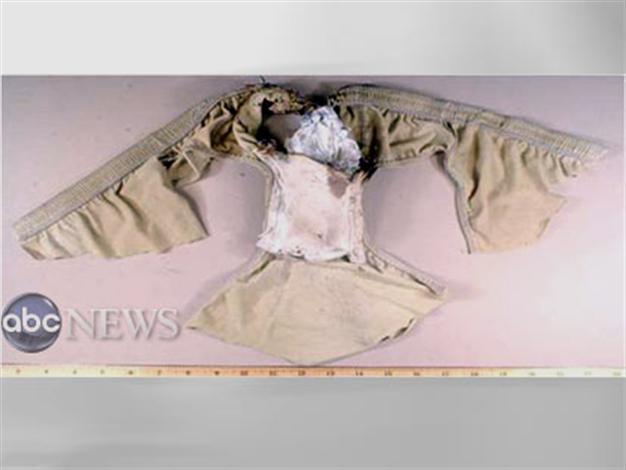US says foils new Al-Qaeda 'underwear' plane bomb plot
WASHINGTON - Agence France-Presse

This image provided by ABC NEWS December 28, 2009 shows an underwear with explosive packet, the slightly charred and singed underpants with the bomb packet still in place. AFP Photo
The United States has foiled a plot by
Al-Qaeda's branch in Yemen to blow up a
US-bound passenger jet with a new take on the "
underwear bomb" near the first anniversary of Osama bin Laden's death, officials said Monday.
The FBI said investigators were examining the explosive that appeared to be a revamped model of the bomb used in the Christmas Day plot of 2009, in which a plastic explosive hidden in a Nigerian man's underwear failed to detonate on a plane headed for Detroit.
The plot hatched by Al-Qaeda in the Arabian Peninsula (AQAP) was uncovered at an early stage and at no point was the public in danger, according to the White House and government agencies.
"The device was for use by a suicide bomber on an airliner," a US counterterrorism official told AFP on condition of anonymity. "At no point were any airlines at risk." Officials, speaking on condition of anonymity, told AFP that the plot was suspected to be targeting a passenger plane bound for the United States.
"The plot itself indicates that the terrorists keep trying... to devise more and more perverse and terrible ways to kill innocent people," US Secretary of State Hillary Clinton said in New Delhi on the final day of a three-nation Asian tour.
"It is a reminder as to why we have to remain vigilant at home and abroad in protecting our nation and in protecting friendly nations and peoples like India and others," Clinton said.
News of the plot was revealed just days after the one-year anniversary of the raid by US Navy commandos that killed Al-Qaeda chief Osama bin Laden at his Pakistan hideout.
"I congratulate the CIA for thwarting this reported plot by AQAP to destroy a US-bound airliner using a specific type of bomb that is of new design and very difficult to detect by magnetometer," Senator Dianne Feinstein, who heads the Senate Intelligence Committee, said in a statement.
The FBI said the improvised explosive device was seized abroad and was "very similar to IEDs that have been used previously by Al-Qaeda in the Arabian Peninsula (AQAP) in attempted terrorist attacks, including against aircraft and for targeted assassinations." Like previous attempted AQAP attacks, the explosive was non-metallic to avoid detection, officials said.
"While similar, a preliminary review of this device shows that it has some significant differences from the device used in the Christmas Day attack. It is clear that AQAP is revamping its bomb techniques to try to avoid the causes of the failure of the 2009 device," the counterterrorism official said.
President Barack Obama was briefed about the plot in April and was told by his deputies that lives were never in danger, said Caitlin Hayden, deputy spokeswoman for the National Security Council.
"While the president was assured that the device did not pose a threat to the public, he directed the Department of Homeland Security and law enforcement and intelligence agencies to take whatever steps necessary to guard against this type of attack," she said in a statement.
AQAP has been linked to the 2009 Christmas plot and is also suspected of orchestrating a 2010 attempt to blow up cargo planes heading to the United States with explosives concealed in printer cartridges.
The latest conspiracy confirmed AQAP as a mounting danger that has gained ground due to unrest in Yemen, officials said.
"It is our assessment that the threat from AQAP is growing due to the territorial gains the group made during the political standoff in Yemen that lasted from early 2011 until this past February. Those territorial gains have allowed the group to establish additional training camps," the counterterrorism official said.
Defense Secretary Leon Panetta said the United States had to stay alert to the threat posed by Al-Qaeda.
"What this incident makes clear is that this country has to continue to remain vigilant against those who would seek to attack this country and we will do everything necessary to keep America safe," Panetta told a press conference after talks with his Chinese counterpart.
The Department of Homeland Security said the latest plot "demonstrates our adversaries' interest in targeting the aviation sector," adding it would continue to use a "layered approach to ensure" public safety.
"These layers include threat and vulnerability analysis, prescreening and screening of passengers, using the best available technology, random searches at airports, federal air marshal coverage and additional security measures both seen and unseen," DHS spokesman Matt Chandler said.
Security at airports and on US-bound airliner flights was tightened since the failed Christmas Day bombing, when spy agencies were heavily criticized for failing "to connect the dots" among intelligence reports.
Nigerian Umar Farouk Abdulmutallab was sentenced in February to four consecutive life sentences for his botched attempt to blow up Northwest Airlines Flight 253 as it approached Detroit, with 289 people aboard.
Hijacked airliners were also used to carry out the September 11, 2001 attacks on New York's World Trade Center and the Pentagon in which nearly 3,000 people were killed.
